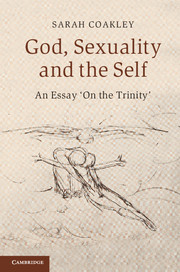Book contents
- Frontmatter
- Contents
- Illustrations
- Preface and acknowledgements
- Abbreviations
- Prelude: the arguments of this book
- Chapter 1 Recasting ‘systematic theology’: gender, desire, and théologie totale
- Chapter 2 Doing theology ‘on Wigan Pier’: why feminism and the social sciences matter to theology
- Chapter 3 Praying the Trinity: a neglected patristic tradition
- Chapter 4 The charismatic constituency: embarrassment or riches?
- Chapter 5 Seeing God: trinitarian thought through iconography
- Chapter 6 ‘Batter My Heart’: reorientations of classic trinitarian thought
- Chapter 7 The primacy of divine desire: God as Trinity and the ‘apophatic turn’
- Coda: conclusions and beyond
- Glossary of technical terms and names
- Scripture index
- General index
- References
Coda: conclusions and beyond
Published online by Cambridge University Press: 05 June 2014
- Frontmatter
- Contents
- Illustrations
- Preface and acknowledgements
- Abbreviations
- Prelude: the arguments of this book
- Chapter 1 Recasting ‘systematic theology’: gender, desire, and théologie totale
- Chapter 2 Doing theology ‘on Wigan Pier’: why feminism and the social sciences matter to theology
- Chapter 3 Praying the Trinity: a neglected patristic tradition
- Chapter 4 The charismatic constituency: embarrassment or riches?
- Chapter 5 Seeing God: trinitarian thought through iconography
- Chapter 6 ‘Batter My Heart’: reorientations of classic trinitarian thought
- Chapter 7 The primacy of divine desire: God as Trinity and the ‘apophatic turn’
- Coda: conclusions and beyond
- Glossary of technical terms and names
- Scripture index
- General index
- References
Summary
I want to end with a recapitulation of my contentious insistence, made at the outset, that contemplation as an ascetical discipline, a regular and repeated act, must attend the insights of any feminist théologie totale. For the true ‘apophatic’ is not just a verbal play, let alone a merely political ploy, but that towards which we are lured – it is ‘mystical theology’ itself, in Dionysius’ terms. And if I am myself right, such a sustained askēsis of prayer has at least six theological implications, which draw together the central theses of this volume and immediately open on to the next. Let me end, then, with six succinct theses, six recapitulated implications of such a regular silent waiting on the divine. It would be appropriate to see these six features as a systematic unfolding of the first mark of a théologie totale on ‘contemplation’, as outlined in Chapter 2 of this volume. These features also point forward to the second volume, since they represent the human, cognitive correlate of what we have here taught about the Trinity, and so demand further critical attention philosophically.
Privileging contemplation: six theses
Thesis 1: The contemplative is one who is forced to acknowledge the ‘messy entanglement’ of sexual desire and the desire for God. A very little time on one’s knees in silence will be sufficient to convince one of that. But this has more commonly led to a fearful disjunction of the two realms than to their alignment. It was Bernard of Clairvaux, after all, who was (in his sermons on the Song of Songs) the great medieval reinvigorator of the quest for God expressed in daring erotic metaphor, but who also wrote (in Sermon 65): ‘To be always with a woman and not to have sexual relations with her is more difficult than to raise the dead. You cannot do the less difficult; do you think I will believe that you can do what is more difficult?’ Herein lies a fundamental pathology, a disjunction that feminist contemplative theology ever seeks to resolve. But it is also the mystics, in their more outré moments, who have pointed the way through this tragic divide: Dionysius with his language of divine desire, Eckhart with his daring sexual metaphors of the birth of Christ in the ‘virgin’ soul, Julian with her ‘mothering’ Christ within the Trinity.
- Type
- Chapter
- Information
- God, Sexuality, and the SelfAn Essay 'On the Trinity', pp. 340 - 344Publisher: Cambridge University PressPrint publication year: 2013



